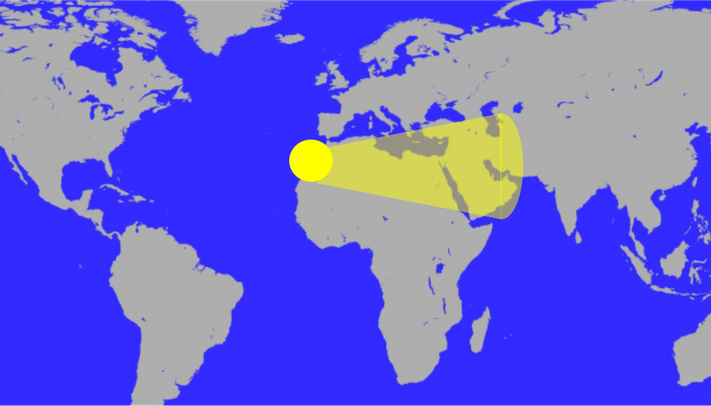Forbes
Jonathan Moed
Morocco’s position uniquely extends throughout the Middle East and North Africa.
Entrepreneurs in the MENA (Middle East & North Africa) region face an uphill battle. From distinct languages and dialects, to different political models and currencies, there’s very little that binds the markets in this region. There’s much potential to be realized in populous markets such as Egypt and smaller wealthy markets such as the United Arab Emirates. In fact, the majority of the region’s consumer base (over 100 million of its 400 million people) are young millennials.
MENA millennials are a particularly attractive audience: they are heavy consumers of content (particularly video) and once acquired, they are exceptionally brand loyal. The challenge is how to effectively engage these populations, whether young or old, across country and culture lines; to identify and navigate the connective tissue that links the region, and test what works and what doesn’t before implementing new ideas. This challenge has been taken on by an unlikely source–a country that is considered neither fully African nor Middle Eastern, and that is just beginning its own startup ecosystem journey: Morocco.
Planting The Seeds For Startup Growth
The Moroccan startup scene is very much in its infancy, in terms of technology innovation and investment activity. However, the ecosystem has begun taking its first steps to achieving startup growth in the future. Before proper technology startup entrepreneurship can take hold in the country, a support system must be established. One organization looking to serve this role and catalyze increased entrepreneurship is Marrakech’s Emerging Business Factory (EBF), the largest co-working space and incubator in Morocco. While in Morocco studying its startup ecosystem, I visited EBF to learn more about it from founder Taoufik Aboudia and meet some of the entrepreneurs looking to ignite Morocco’s technology innovation.
Exterior and entrance to the Emerging Business Factory EBF
EBF opened in late 2015 as a one-stop-shop for local entrepreneurs looking to build businesses. The space operates at the intersection of technology and design, offering not only work space but also a design and photography studio. Its client roster reflects this balance of technical and design expertise, as do many of the initiatives currently underway. What makes EBF stand out is that Aboudia and Co-founder Pascal Chevalier–both digital media industry veterans – have emphasized using technology and design to solve real-world problems within Morocco.
Solving Real-World Problems
There is no shortage of real-world problems to be solved in Morocco, a country with low employment rates, widespread gender inequality, and rampant corruption. The team at EBF has started to tackle high-impact social issues to improve life in Morocco for its 35 million people. For instance, after the mayor of Marrakech spoke about pollution and safety concerns resulting from the city streets being overrun by motorcycles and scooters, EBF hosted a hackathon to address the issue. Several teams created prototypes over the course of the event that have since transformed into fully-functional products. One such product, Casky, is a connected device placed on helmets that visually display when a driver is turning or stopping and can be controlled by the driver using buttons or automatically by detecting the driver’s head motions. Many of the companies involved are now taking steps to accelerate and commercialize their products.
Following the success of the two-wheeled vehicle hackathon, the government is interested in working with EBF to find creative solutions to improve another national issue: water management. However, as Aboudia made clear, EBF only intends to devote effort to social projects that are open to the public, transparent, and real. Because the issues at hand have large-scale implications, he and his team are cautious in monitoring proposed funding levels and the caliber of submissions to ensure a successful outcome led by entrepreneurs and supported by the government as opposed to government-driven and supported by entrepreneurs.
Domestic Market Obstacles
While momentum surrounding Morocco’s entrepreneurs is starting to pick up, market realities may very well preclude scalable and sustainable startup growth in the country for the near future. It is currently very hard to build technology companies in Morocco for the Moroccan market. This is due to a variety of factors: from a cultural perspective, the business culture in Morocco is one of informal hustling, re-selling, and quick returns as opposed to formal business and investment in strategic growth. Walking through the streets of Marrakech and its central market, the Medina, is a wild experience devoid of any semblance of a corporate setting, and being an ‘entrepreneur’ takes on a different meaning–focused entirely on sales–than in more established global markets. Vendors aggressively push their products, which are typically undifferentiated from those in neighboring stalls. Casablanca, the commercial capital of Morocco, is more mature and formal in this sense, although even in this city entrepreneurship exists much of the time in name and appearance only as opposed to in practice.
In addition to the lack of formal business culture, trust is a big issue among Morocco’s entrepreneurs. Theft of intellectual property is a frequent occurrence, as local investors will hear business ideas and swiftly steal them. Then there’s the consumer market: a small, fragmented market with a large segment of relatively uneducated consumers. To date, the country’s adult literacy rate is under 70%. These issues, coupled with the nationwide inequality and corruption mentioned earlier, make it incredibly challenging for Morocco’s startup ecosystem to grow.
However, the value of the Moroccan ecosystem does not depend entirely on its ability to prop up homegrown startup success stories domestically, and must not be judged as such. In fact, much of its current and potential future value lies in its role as a testing ground and hub for scaling to other markets throughout MENA.
A Cultural Laboratory
Morocco has always been and continues to be a cultural laboratory, uniquely positioned between Europe, North Africa, and the Middle East. Historically, Morocco served as a commercial focal point between these regions, as its nomadic indigenous peoples moved between the geographies and facilitated international trade. This dynamic continues even today, as the ethnic melting pot that is Morocco incorporates many streams of culture, from its Islamic roots, to its geographic connection to North Africa, to its role as a summertime destination for many Europeans.
It’s important to keep in mind that the MENA region as it exists today is still very young, with many of its countries having been colonized up until a hundred or even fifty years ago. These countries are still working to determine correct political and economic models, let alone a model for startup success. That’s why Morocco, with its unique understanding and reach into the consumers and preferences of these different markets and how they may connect, offers a diverse population to test new technologies and understand which markets will benefit most or be most receptive to these ideas. One of the reasons why starting up in Morocco is so difficult–its fragmented market with cultural connections to many diverse countries–is the reason why it is a useful hub and feeder ecosystem for the rest of MENA.
Exporting Talent & Tech
Morocco’s value as a testing ground and feeder ecosystem is especially apparent for companies looking to expand to the Middle East. While in Casablanca, I sat down with Mehdi Benslim, Founder and CEO of Buzzkito, Morocco’s leading digital media and brand tech company. Buzzkito has grown its presence to cover 24 countries across MENA by catering to the region’s affinity for video content–the company’s video content amasses 3 billion views per year. Buzzkito was founded in Morocco in 2006, and originally created content for the Moroccan market in the Moroccan Arabic dialect. However, Benslim soon picked up on the fact that a large Middle Eastern audience was watching the videos. Armed with this insight, Benslim and his team developed a new content strategy focusing on emotion-based content and using non-verbal communication to simultaneously target audiences throughout the region, from Tunisia to Saudi Arabia. Here’s an example of Buzzkito’s emotional content:
In 2016, Buzzkito opened an office in Dubai to more actively focus on Middle Eastern markets. This has led to rapid growth, bolstered by a US$1.7 million Series A round raised at the beginning of 2018.
Another company with Moroccan roots that has seen success expanding to the Middle East through UAE is cyber security firm Vul9. Moroccan founders Mohamed Amine Belarbi and Mohamed Zakariae El Khdime met in Abu Dhabi, and leveraged their regional knowledge and connections to build a thriving business that counts Moroccan software provider Manageo, regional ride-hailing company Careem, and e-commerce marketplace Souq.com (acquired by Amazon) as clients.
Scaling beyond the region has proven more difficult for Morocco’s leading startups given how tough it is for Moroccans to gain access to and learn from other regional markets. In particular, its very tough for Moroccans to secure visas to travel to Europe or the United States, which impedes the ability of local entrepreneurs to gain the cultural insights and build the relationships necessary to understand these markets. EBF’s Taoufik Aboudia relayed the story of a senior developer from one of Morocco’s most well respected digital media agencies who applied for a visa to tour and learn from America’s startup hubs, and was granted a visa that lasted only 10 days.
Global expansion is not yet viable for Morocco’s companies. But, for entrepreneurs or investors looking to break into and capture market share and consumers across MENA, Morocco is a worthy starting point to get a centralized view and understanding of the region, and contemplate where and how to grow.
Jonathan Moed is traveling the world on Remote Year, meeting with startups and the entrepreneurs behind them while exploring global startup ecosystems.










